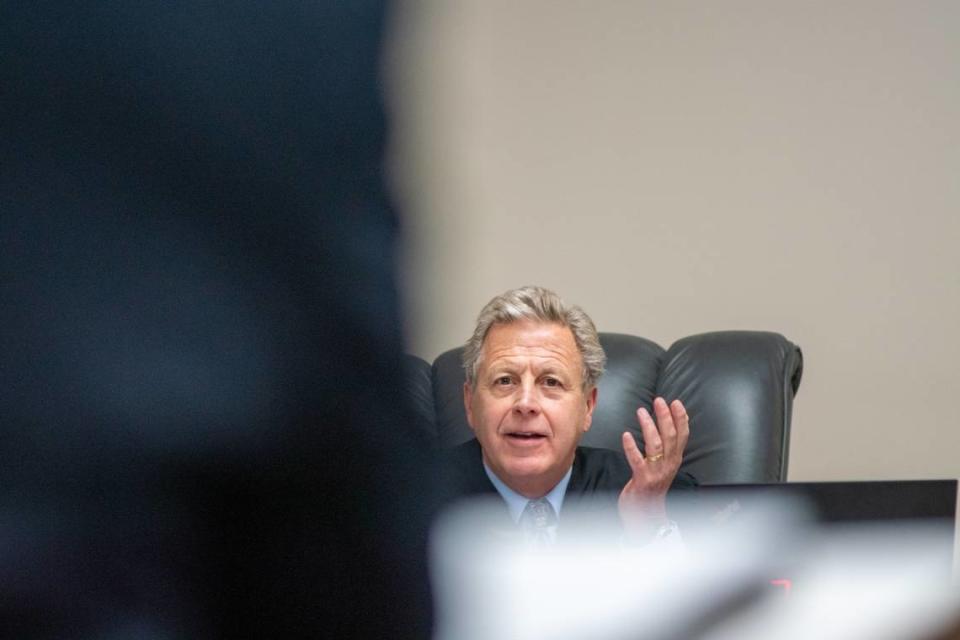Judge in Idaho murder case rules on whether to toss Kohberger’s grand jury indictment
The Latah County judge in the University of Idaho student murder case threw out all attempts by the defense to toss the grand jury’s indictment of defendant Bryan Kohberger, shutting the door on delaying a future trial on those grounds.
Judge John Judge of Idaho’s 2nd Judicial District issued his written decisions late Friday to deny the defense team’s request to dismiss the indictment on five legal grounds, including that the prosecution committed misconduct because it allegedly withheld evidence from the grand jurors. Judge’s rulings were published to Idaho’s court website Monday morning.
In one decision, Judge dismissed the defense’s request to discard the indictment on four separate arguments — each debated during a closed-door hearing in October to protect confidential information, as grand juries are an intentionally secretive judicial process. The defense had alleged prosecutorial misconduct, bias from the local grand jury, use of improper evidence and a lack of sufficient evidence to indict Kohberger in the killing of four college students.
The victims were U of I seniors Madison Mogen and Kaylee Goncalves, both 21; and junior Xana Kernodle and freshman Ethan Chapin, both 20. They were stabbed to death at an off-campus home on King Road in Moscow.
Judge accepted none of the defense’s arguments to dump the grand jury indictment.
“Kohberger has failed to successfully challenge the indictment on grounds of juror bias, lack of sufficient admissible evidence or prosecutorial misconduct,” he wrote. “Kohberger was indicted by an impartial grand jury who had sufficient admissible evidence to find probable cause to believe Kohberger committed the crimes alleged by the state.”

Judge noted in the order that his ruling on these four grounds will remain sealed but provided the results of his decision “for the public’s benefit.” He also acknowledged in his Friday court filings having reviewed sealed grand jury transcripts, recorded audio and jury questionnaires to help make his decisions. The defense has access to that same information, he wrote.
The closed October hearing was one of two held that day to consider a number of legal arguments posed by the defense. The other hearing was left open to the public.
At the second hearing, Judge issued an oral ruling from the bench concerning the defense’s effort, quickly dismissing the argument from Kohberger’s attorneys that there was an error in the instructions given to the grand jury. They had argued that an indictment should be based on a higher legal threshold of beyond a reasonable doubt — the same as at trial — versus the Idaho grand jury standard of probable cause, but failed to convince Judge to support their claim.
“The grand jury is not trial jury,” he wrote in a formal written ruling issued Friday. “Its function is to screen whether or not there is sufficient evidence to proceed to trial” based on probable cause.
A ‘Hail Mary’ legal argument
The argument made by Kohberger’s defense for the higher standard for a grand jury to indict was seen by legal experts as unlikely to succeed. Retired Idaho Supreme Court Chief Justice Jim Jones described the effort as “some kind of Hail Mary thing,” the Statesman previously reported.
Jay Logsdon, one of Kohberger’s public defenders, signaled in his public comments before the court in October that the defense was aware tossing the indictment in favor of a preliminary hearing was a tall order.
“As your honor let me know this morning, we’re probably not going to change your mind because the Idaho Supreme Court — I think the court thinks — has gone the other way,” Logsdon told Judge during the afternoon public hearing.
Boise-based criminal defense attorney Edwina Elcox predicted Judge’s rulings related to the indictment.
“While there was a novel legal theory asserted, it just didn’t comport with the entire jurisprudence of the state,” Elcox told the Statesman by phone Monday. “I’m not saying there’s not a reason to obviously challenge things, but it would mean that both the judiciary and criminal law practitioners have gotten this wrong, and there was just no legal basis for it.”
Kohberger, who turned 29 last month, was arrested at his parents’ home in eastern Pennsylvania in December. He’s charged with four counts of first-degree murder and one count of felony burglary in the November 2022 homicides and faces Idaho’s death penalty if convicted.
Kohberger was arraigned in May after the grand jury indicted him on the five felony charges following its secret proceedings over three days earlier in the month. He stayed silent when Judge asked him to enter a plea, which led the judge to enter it as not guilty on Kohberger’s behalf.
Kohberger, who at the time of the killings was a graduate student at Washington State University in Pullman, was previously scheduled to go to trial in early October. That was postponed after he waived his right to a speedy trial in August, delaying the legal proceedings indefinitely.

